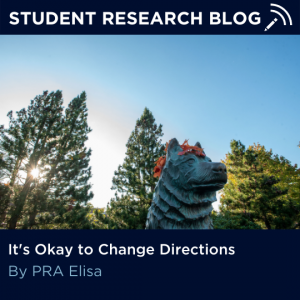By Elisa Shaholli, Peer Research Ambassador
 When synthesizing ideas – whether it be for a research project, a plan for a class paper, or even just an idea for something personal like a DIY project – I fall into the line of thinking of ‘this idea needs to be completely thought out and perfect.’ The more fool-proof the plan, the better the idea, because if it changes directions, that means my project wasn’t great to begin with and I’m doing it all wrong, right?
When synthesizing ideas – whether it be for a research project, a plan for a class paper, or even just an idea for something personal like a DIY project – I fall into the line of thinking of ‘this idea needs to be completely thought out and perfect.’ The more fool-proof the plan, the better the idea, because if it changes directions, that means my project wasn’t great to begin with and I’m doing it all wrong, right?
Well….. It’s actually the opposite!
At the end of my first year, I applied for a UConn IDEA Grant. I had a plan for a literature-based project: I’d be reading memoirs; analyzing them with a specific approach that worked well with my project questions, field of study, and one that my project mentor recommended looking into; and I even had the books and material I would look at all figured out!
Flash forward a few months later, when I’m further developing my project and rereading my project plan, I started to think about whether reading memoirs was the way to go. Was this really what I wanted to do? Would this method be the best given what I’m trying to find out? If it’s not, what am I supposed to do? My entire project plan felt like it was teetering off a cliff that I couldn’t catch in time before it fell to the ground. I remember thinking about how interesting it would be to conduct interviews with people and to be able to ask follow up questions that I couldn’t do when reading a memoir. I was anxious though: is this even a good idea? Maybe I should just stick with my initial plan…. This new plan would also need an Institutional Review Board (IRB) approval, and would that process even be worth it?
I remember talking with my mentor about what I was feeling and why I wanted to change directions and how I would explore my project questions. After sharing what I was thinking, I decided on transitioning to an interview-based project, and I couldn’t be happier with that decision.
The change in direction meant I had a bit of catching up to do (I had to learn and complete the Institutional Review Board process during the summer), but I ended up having a project that I enjoyed so much more than my initial idea. Although I’d still like to check out those memoirs at some point, the interviews gave me the opportunity to have conversations and interact with diabetics of all different backgrounds. It made me much more comfortable speaking with new people and building relationships, alongside giving me a lot of material that explored my project questions.
When I first wanted to change directions, I thought that my project was fundamentally flawed and that with this change, it meant I’d be “behind” or doing something “wrong.” However, the truth is, there is no “behind” and there is no “wrong” in research. The beauty of research is exploring and changing directions as you go on. Making changes means that your idea is expanding and you are tackling new approaches to a problem. Changing directions doesn’t mean you are failing, it means that you and your project are growing together, and that’s fundamentally what research is all about: finding out more about your topic, and yourself!
So, if you are going through something similar to what I went through, I’d recommend reaching out to your PI/mentor to talk through everything. If you do end up changing your project plan, have confidence in yourself and realize that research is like a living entity: it can change, and change doesn’t signal something “bad.” The change might end up making your project so much better than what you initially planned– I know that’s what happened for me!
Elisa is a junior majoring in Economics with minors in English and Global Studies. Click here to learn more about Elisa.